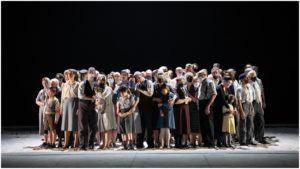
Royal Opera House 2022 Review: Nabucco
Amartuvshin Enkhbat Delivers Knockout Turn in Faltering Revival of Verdi’s Old Testament Epic
By Benjamin Poore(Credit: Bill Cooper)
A much-anticipated revival of Verdi’s breakthrough Old Testament drama on the life of Nebuchadnezzar opened before Christmas with its second cast.
COVID supervened to scratch performances until January – which in theory would’ve seen Anna Netrebko make her role debut as Abigaille, one frequently thwarted by the pandemic. As it happened, travel restrictions meant an evening senza Netrebko, replaced by the Ukrainian soprano Liudmyla Monastyrska – herself the original Abigaille of Daniele Abbado’s ashen production. Conductor Daniel Oren, too, was indisposed, replaced at short notice by Renato Balsadonna, who had formerly run the chorus at the ROH.
Dour & Clunky
Abbado’s production is gray and monumental, with spare stone blocks, sandpit, and chicken-wire sculptures evoking the stark cruelty of unchecked power, and the moral emptiness of ambition. Alison Chitty’s monoliths are a nod to the Holocaust memorial of Berlin, and the twentieth-century costumes contextualize the action with an epoch especially associated with mass displacements and genocides, which dovetails straightforwardly with a text unequivocal about annihilating a people, rigid with declamatory Old Testament iron.
But there are a fair few pitfalls that lead to it being a somewhat dour and dramatically clunky affair. Redundant projections – a sort of god’s eye view of the stage from above – suggests anxieties about keeping the audience interested. A cavernous set makes the action feel static, and leads to odd stage pictures in relation to plot – Nabucco stands amongst the preparations for the very execution he is about to dramatically forestall, while Fenena sings on obliviously. The idol smashed in the denouement is striking enough – a kind of wicker man that speaks of the literally transparent character of authority – but is destroyed in the naffest way possible, halfheartedly taken apart by the actors, generating giggles in the audience.
For an opera so chorus heavy – and so much about community – the Jews and Babylonians felt strangely undifferentiated (perhaps the vague costuming is making a point about perpetrators and victims?), as did individuals in the chorus itself (save a terrific wriggling child actor, who brought a bit of verve to proceedings). So too were they often shunted to the side of the stage’s central square, so ended up feeling rather like awkward spectators in their own show. But at least the great “Va, pensiero” chorus hit the right dramatic beats: a literal huddled mass of the wretched of the earth, lit from above, singing (a little behind the beat, granted) with vulnerability and fragile hope. Their sudden surge in intensity in “Oh mia Patria, sì bella e perduta” was an object lesson in the studied deployment of vocal color and weight in such forces.
Delivering in Spades
The opera offers a powerful prototype for Verdi’s broken patriarchs – Rigoletto, Miller, Filippo II – in its titular character, a great baritone role with scope for unctuous cantabile lyricism, shattering psychological climaxes of paranoia and grandiosity, and electric top notes. Amartuvshin Enkhbat delivered all of the above in spades, including a spectacular A-flat, despite the production’s unevenness in both design and direction. (Dramatically planting your foot on a pile of books is a great example of when less really isn’t more if you’re trying to sell cold command and unimpeachable authority to the audience).
His breakdown at the climax of Act two (“Non son più re, son dio”) had a Lear-like intensity, even if the way he sank to the ground was a little clunky (some things, in opera, never change); his lyrical return in the Act four was rich and authentic, the whole register filled with the warmth of redemption and contrition.
Alexander Vinogradov offered equally outstanding singing as High Priest Zaccaria, showing off a charismatic and well-oiled instrument that plumbed the inky depths of prophecy and doom. “Vieni, o Levita,” his reading of the law-giving tablets, was dense with gravitas and portent; Vinogradov has richness but also a profound lyric quality that lets him unfurl melodic lines with remarkable security and smoothness.
Tale of Two Halves
Monastyrska had a very uneven first half – unforgiving though the role is – with a very insecure upper register and wildness in many of her top notes, seemingly unable to settle into secure legato singing. But the interval seemed to make all the difference, and she found her stride in Act three, with especially fine soft singing – velvety and smooth at the top of “Anch’io dischiuso un giorno” – and explosive virtuosity and intensity in her cabaletta aria “Salgo già del trono aurato.”
Najmiddin Mavlyanov doesn’t get much to do in the rather diminished tenor role of Ismaele, but sang with crisp ardor nonetheless. The more substantive contribution of Fenena belonged to Vasilisa Berzhanskaya, whose preparation for martyrdom was glassy and fragile.
Balsadonna conducted the score with precision and luxury in equal measure, on what was truly an excellent evening for the orchestra. Especially remarkable were the plaintive cello solos Verdi lavishes on us; Balsadonna and the pit channeled the taut energies of the overture in a way that summoned febrile excitement and lingering menace.
A mixed bag of a production, but the musical values are considerable.


